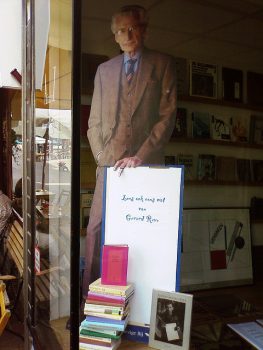Book Review: The Evenings by Gerard Reve Posted by Karoly Molina on Mar 15, 2017 in Uncategorized
This month’s pick for Dutch literature was The Evenings by Gerard Reve. This book is one of the most famous Dutch novels and a certain read for high school students. But what is this novel about and is it really all that it is hyped up to be?
Reve was born on December 1923 in Amsterdam. He is considered to be one of De Grote Drie or one of the great three Dutch post-war writers. The other two are Harry Mulisch, whom I have mentioned in other book reviews, and Willem Frederik Hermans. Reve was a controversial writer in his time because of his open homosexuality in a time when it wasn’t quite accepted as it is now. Some of his writing was also very explicit, to the point of being sued for it.
De Avonden is by far his greatest work and has long been compared to other great writers of his time such as Salinger and Camus. It was first published in 1947 and was finally translated to English at the end of last year. When I first read about this novel, I was curious to know if it could possible stand next to the amazing work of Harry Mulisch.
De Avonden tells the story of Fritz, a very particular and interesting character full of weird fears and habits. The novel basically tells us about Fritz’s last few evenings of the year 1946. Fritz’s job, according to what he tells us in the novel, is quite unimportant for him. His everyday goal is to find something to do in the evenings to not only avoid his parents and their quirks that drive him mad, but also to have something to do. In the novel, we read about his visits to friends’ houses and parties and to the movies and strolls around the city. The novel also describes the quirks and weirdness of a character who is potentially quite disturbed.
According to a few articles I read, the novel was highly criticized when it was published because it does not mention anything about the Nazi occupation nor the war. This is quite bizarre considering that the Netherlands had been liberated 3 years before and the whole country was still in a process of reconstruction. I can understand why this would be something unexpected, however, given the terrific work of Mulisch in The Assault, I can also appreciate the fresh new topic Reve gave us in De Avonden.
For those of you who haven’t read The Evenings or other works by Gerard Reve, I highly recommend you do. His style is very different to what I expected, but there must be something to him if he is one of De Grote Drie.
There is also a movie version for those interested. You can watch it in the following video.
https://youtu.be/yAbElh3rqRI
If you have read this novel or any of the works by Reve, what are your opinions?

Build vocabulary, practice pronunciation, and more with Transparent Language Online. Available anytime, anywhere, on any device.





Comments:
Michelleprado:
Your great miss Karoly g molina I hope you can teach me how to speak Dutch because I have a crush someone in Netherlands but he did’nt know and I’m willing to know other language my dream is to travel in Netherlands to meet that guy I hope someday
Michiel (pronounce THAT….):
Nice piece. Reve is a great author, probably the best Dutch one ever.
He also has his role in political/social history: Being both Catholic and gay, he once floated the idea that God was a donkey, and that the only thing he really wanted to do is ‘take God from behind’.
He was sued for blasphemy, but won the case. Sort of a watershed in the sixties. Blasphemy was a dead law from then on.
The scene I’m talking about:
En God Zelf zou bij mij langs komen in de gedaante van een éénjarige, muisgrijze Ezel en voor de deur staan en aanbellen en zeggen: ‘Gerard, dat boek van je – weet je dat Ik bij sommige stukken gehuild heb?’
‘Mijn Heer en mijn God! Geloofd weze Uw Naam tot in alle Eeuwigheid! Ik houd zo verschrikkelijk veel van U,’ zou ik proberen te zeggen, maar halverwege zou ik al in janken uitbarsten, en Hem beginnen te kussen en naar binnen trekken, en na een geweldige klauterpartij om de trap naar het slaapkamertje op te komen, zou ik Hem drie keer achter elkaar langdurig in Zijn Geheime Opening bezitten… (Van het Reve, Nader tot U, 112-113)